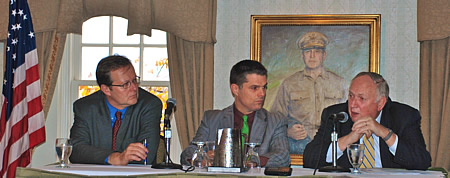Nuclear Modernization Talk at BASIC Panel
 |
| Linton Brooks and I discussed nuclear modernization at a November 13 panel organized by BASIC. |
.
By Hans M. Kristensen
BASIC invited me to discuss nuclear weapons modernization with Linton Brooks at a Strategic Dialogue panel held at the Capitol Hill Club on November 13, 2012. We’re still waiting for the official transcript, but BASIC has a rough recording and my prepared remarks are available here. [Update: all material, including transcript with questions/answers, is available from BASIC].
In my talk, I argued that the Obama administration’s nuclear arms control profile is at risk of being overshadowed by extensive nuclear weapons modernization plans, and that the approach must be adjusted to ensure that efforts to reduce the numbers and role of nuclear weapons and put and end to Cold War thinking are clearly visible as being the priority of U.S. nuclear policy.
The administration has nearly completed a strategic review of nuclear targeting and alert requirements to identify additional reductions of nuclear forces. Release of the findings was delayed by the election, but the administration now needs to use the review to reinvigorate the nuclear arms reduction agenda that has slowed with the slow implementation of the modest New START Treaty and the disappointing “nuclear status quo” decision of the NATO Chicago Summit.
The last remaining agreement limiting U.S. and Russian nuclear weapons has now expired. For the first time since 1972, there is no treaty-bound cap on strategic nuclear weapons.
The Pentagon’s new report provides additional context and useful perspectives on events in China that took place over the past year.
Successful NC3 modernization must do more than update hardware and software: it must integrate emerging technologies in ways that enhance resilience, ensure meaningful human control, and preserve strategic stability.
The FY2026 National Defense Authorization Act (NDAA) paints a picture of a Congress that is working to both protect and accelerate nuclear modernization programs while simultaneously lacking trust in the Pentagon and the Department of Energy to execute them.